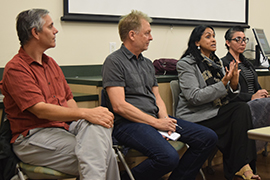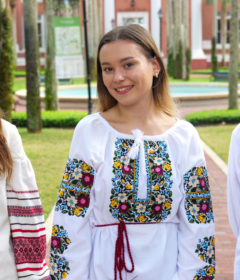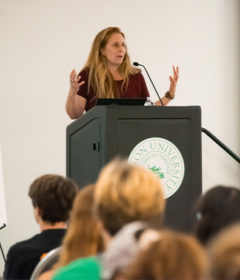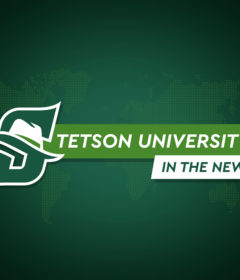Stetson Panel Explores Environmental Justice and Immigration


Stetson University will host a series of panel discussions focused on environmental justice and the first one explored how poverty and violence are sending a surge of immigrants across the U.S. border.
The recent panel focused on environmental immigration and its causes: violence, industrial agriculture, insufficient wages, and the immigrants’ fear for their lives in their homeland, the panelists said.
“They just want access to things that are basic human rights,” Rajni Shankar-Brown, Ph.D., an associate professor in Stetson’s Department of Education, said during the Nov. 10 panel discussion.
According to the panelists, the immigrants face trials and tribulations when they come to the United States, often to work as migrant workers, whose low pay and poor working conditions help provide the country’s abundance of cheap food.
“These people risk their lives to cross the border,” said Luis Paredes, Ph.D., director of Diversity and Inclusion at Stetson. “It’s not like they just have open access. People die.”
The panel, entitled “Environmental Justice in the 21st Century: Displacement, Belonging, and Agriculture,” was made up of faculty and staff from Stetson. They discussed organizations in which students can get involved, and help create better working and living conditions for migrant farm workers.
“When someone is valued based on how many pounds they move in a day, it’s dehumanizing,” said Tony Abbott, Ph.D., a professor in Environmental Sciences and Geography. “It makes someone not much different than a tractor.”
The Environmental Justice panel was the idea of Stetson student Sarah Coffey and was sponsored by the Cross Cultural Center.
Coffey, a junior and an Environmental Fellow, wanted to explore the interactions between ecology and humans. She says the two are inherently linked, and it does not make sense to analyze an environmental issue without looking at its implications on society, and vice versa.
“We are all a part of nature and our livelihood and survival depends on how well we treat the Earth,” she wrote in an email. “What we are seeing today is a lot of poor people paying for the costs of the actions of a few greedy people. The rest of us are bystanders, but we are complicit in this injustice when we don’t speak up for the Earth and her people.”
The series will continue in the Spring 2017 semester at Stetson.
“As an educational institution, we have the responsibility to lead by example rather than just teaching about it,” said Coffey.
– The Environmental Fellows are organizing a service project on Saturday, Dec. 3, from 9 a.m.-12 p.m. to help the Farmworker Association of Florida by mulching, weeding and planting in the garden beds at its Pierson office. If you’re interested, email Sarah Coffey at [email protected].
-Rhiannon Boyer



